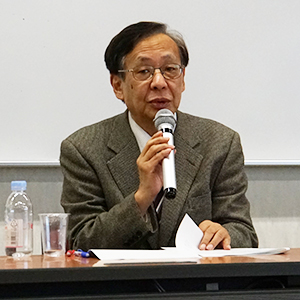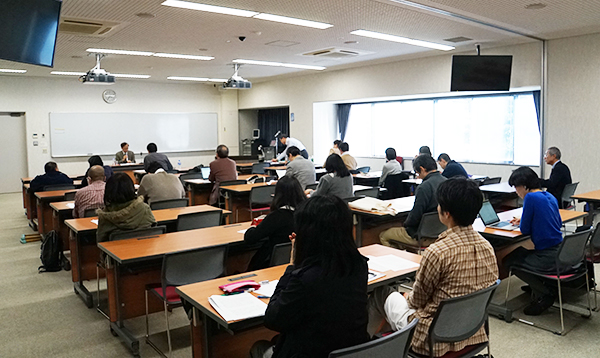Lecture series for the launch of the Institute for Liberal Arts
In line with Tokyo Tech's ongoing education reform, the implementation of the new education system in April 2016 will bring with it the establishment of the Institute for Liberal Arts.
In preparation for this, the working group of the Institute for Liberal Arts is holding a total of seven lectures to examine the Institute's global-oriented approach on liberal arts from various perspectives.
These lectures are for Tokyo Tech graduate students, faculty, and staff, but the seventh lecture of the series was open to the public.
Lecture 7
Understanding the importance of effective writing

Professor Higuchi
Professor Yuichi Higuchi, the author of many books including the best seller "Speech patterns of brilliant and non-brilliant minds", has a proven track record in teaching essay writing. With Tokyo Tech Professor Tarou Yamazaki of the Foreign Language Research and Teaching Center as moderator, Higuchi gave a lecture on the art of writing and led a practice session focused on persuasive writing techniques.
In his lecture, Higuchi introduced the writing method he has developed, shared ways to correct texts written by others, and stressed the importance of developing one's writing ability.
This ability is particularly important for university students and working adults, who not only need to effectively pass on information, but must also persuade others of their opinions. The act of writing functions as an exercise in critical thinking. It requires from the writer a social viewpoint, and therefore enhances one's ability to absorb information. In addition, one cannot write without having ideas and opinions, and writing helps develop these, Higuchi elaborated.
The professor also touched on the difference between a composition and an essay. While the former is about experiences and feelings, the latter expresses the right and wrong of a matter, and therefore requires clear articulation of one's position and persuasive justification of this position. For this reason, the structure of an essay is crucial. As examples of persuasion and structure, Higuchi mentioned the three reasons method commonly used in French to support a statement, and pointed out that long-running cartoons and mystery novel series are successful because of their familiar pattern, or structure.
To demonstrate one way to attain structure, the professor then introduced the Higuchi style four-part writing method consisting of the following:
- 1.
- Presentation of the problem
- A yes-no-style introduction
- 2.
- Presentation of the opinion
- Articulating one's yes or no position
- Grasping the actual situation
- Presenting one's opinion using patterns such as "Indeed ..., but ...," and therefore giving consideration to counter opinions
- 3.
- Development of the argument
- Illustrating the basis of one's opinion
- Examining the background, causes, historical processes and underlying ideology of the matter to make the writing cogent
- 4.
- Conclusion
- Organizing and restating one's opinion
When correcting text written by others, Higuchi stressed the importance of clearly communicating issues that need correction and offering suggestions so writers can rewrite the material themselves. He proposed the following checkpoints:
- Structure
- Potential misinterpretation of facts
- Logic
- Persuasive argument

Higuchi suggested that one should not discuss principles or rules with the writer to avoid judging their sense of values. He then demonstrated by correcting four essays.
Lastly Higuchi introduced one of his courses at Tamagawa University where students can improve their persuasive writing abilities, and eventually enhance their communication, negotiation, and other comprehensive skills. Lecture participants were then able to practice their persuasion skills by composing a written request for a loan.
To conclude the session, moderator Yamazaki left the participants with a quote from one of Higuchi's books: "I have merely taken you to the entrance of the mountain range of prose. To conquer the massive ridges that lie beyond, the Genji Monogataris and The Brothers Karamazovs, you must keep writing."
The Institute for Liberal Arts lecture series is supported by the Top Global University Project funded by the Ministry of Education, Culture, Sports, Science and Technology.
. Any information published on this site will be valid in relation to Science Tokyo.





